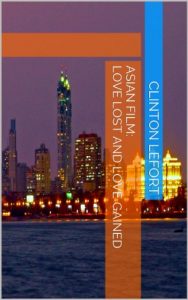Rashomon and Chunking Express show the depths of emotion in the human heart. While Rashomon reveals the betrayal of truth for a lie, Chunking Express expresses the truth of love loss and the difficulty of finding true love. Rashomon shows that love once found can be lost. When love is found other events can force their way in change love to hate. Chunking Express shows that the emotion and experience of love may be common as a busy street and candy bar, but its depths are not easily experienced without commitment and trust. Both Rashomon and Chunking Express have proven to be successful Asian films in their own rights Both have a story to tell and cannot be easily compared, though they can be enjoyed both initially and at more than one sitting.
Taken From Chapter One:
Film experts, directors, screenwriters, actors and critics say Rashomon “struck the film world as a thunderbolt.” (Ebert,Rashomon,1950) Rashomon tells the story about three people who witness a murder, but neither one of them verifies their testimony. Each person is called to court to explain to authority what they witnessed. A woodcutter, a priest, a police investigator seeking a criminal and the criminal all give their testimony of what happened. While each person encounters the murdered man and his wife differently. Tojamaru, the bandit who was captured admits that he killed a man so that he could have his wife. Tojomaru’s story doesn’t fit the story of the priest and woodcutter. Everyone’s story contradicts everyone else’s story. Kurosawa seems to want his viewers to believe that humans cannot tell the truth and that even testimony has its faults. Testimony depends upon the way people perceive things and how others want to be heard. Tojamaru said that after seducing the man’s wife his wife begged him to let her husband sword fight him for the sake of her honor. The wife testifies with a different story than the one told by the priest and woodcutter. Tojamaru testifies with a different story than the one testified by the wife he offended. The wife was left alone with her husband who felt ashamed before her husband and begged for his forgiveness. Her husband only looked upon his wife with cold loathing, but without showing any emotion.
Taken From Chapter One:
Film experts, directors, screenwriters, actors and critics say Rashomon “struck the film world as a thunderbolt.” (Ebert,Rashomon,1950) Rashomon tells the story about three people who witness a murder, but neither one of them verifies their testimony. Each person is called to court to explain to authority what they witnessed. A woodcutter, a priest, a police investigator seeking a criminal and the criminal all give their testimony of what happened. While each person encounters the murdered man and his wife differently. Tojamaru, the bandit who was captured admits that he killed a man so that he could have his wife. Tojomaru’s story doesn’t fit the story of the priest and woodcutter. Everyone’s story contradicts everyone else’s story. Kurosawa seems to want his viewers to believe that humans cannot tell the truth and that even testimony has its faults. Testimony depends upon the way people perceive things and how others want to be heard. Tojamaru said that after seducing the man’s wife his wife begged him to let her husband sword fight him for the sake of her honor. The wife testifies with a different story than the one told by the priest and woodcutter. Tojamaru testifies with a different story than the one testified by the wife he offended. The wife was left alone with her husband who felt ashamed before her husband and begged for his forgiveness. Her husband only looked upon his wife with cold loathing, but without showing any emotion.






